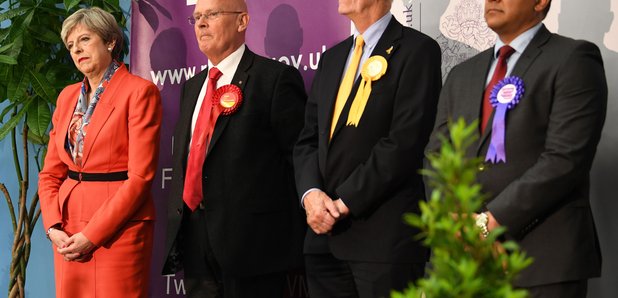
Matt Frei 10am - 1pm
9 June 2017, 08:12 | Updated: 9 June 2017, 11:25

Theresa May's snap election has backfired with the Conservatives failing to secure a majority, and the election resulting in a hung parliament.
The general election has resulted in a hung parliament, but what does that mean? And what happens next?
A hung parliament means that no one party has won an overall majority, and thus the right to govern.
A majority is when a political party has more seats than the other parties put together (at least 326 seats), and is needed so that a party can pass its laws through government without being defeated by opponents.
The 2010 general election ended in a hung parliament, but the Liberal Democrats and Conservatives then formed a coalition.
A coalition is when two or more parties join forces to govern as a single unit, and ministerial positions are offered to both parties.
Following the result of this election, the Conservative government will remain in office as a minority government, with Theresa May able to continue living in Downing Street - but only until a new government is formed.
The options are as follows:
Negotiating teams and leaders from across the parties will currently be in talks as they try to put together a coalition government.
It is currently being hinted that Northern Ireland's Democratic Unionist Party (DUP) could form a minority government with the Conservatives, not an official coalition government.
Theresa May could opt to avoid a coalition and try to run a minority government, meaning the Tories would have to rely on the support of smaller parties when trying to get laws passed.
Corbyn does not have to wait for Theresa May to decide before trying to get a deal of his own. He can hold talks and attempt to form a coalition at the same time.
Negotiations could take a number of days, and took five days in 2010. There is currently a deadline in place of June 13. Theresa May has until this date to put together a deal to keep herself in power, or resign.
Mrs May could take a gamble and wait until the new parliament to see if she has the confidence of the House of Commons. The Conservative government would have to get a certain number of votes to get its programme of proposed new laws passed in the Queen's Speech on June 19. If passed, the government will fill all of the ministerial positions themselves.
If it becomes clear that Theresa May cannot put together a minority government, and no coalitions have been formed, she is expected to resign and the leader of the opposition (Jeremy Corbyn) would then become Prime Minister.
The Labour Party would then attempt to form a minority government and get its programme of proposed new laws passed in the same way.
If this does not work out, and all options have been exhausted, then a fresh election is called.